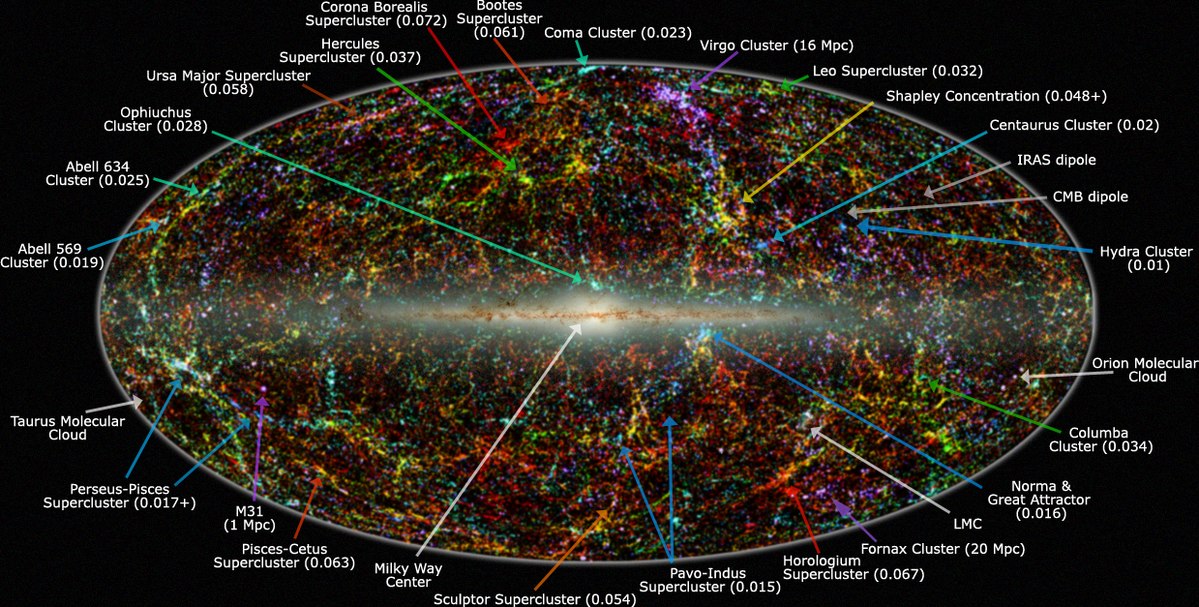All indications at this point say that the universe began in an instant at a point and has been expanding ever since. Some force other than gravity is pushing it to expand, and we don't know what that is.
The speed of light in a vacuum is constant. It cannot and does not change.
It hasn't, that's the point. Light moving through a vacuum always moves at the same speed.
Actually, the Big Bang theory postulates that the universe started as pure energy because matter only formed after it cooled down enough for elementary particles to coalesce into being.
Except the universe is expanding fast enough that gravity can't pull it back together. If it stops expanding, it could contract again into a Big Crunch, followed by a bounce, but as of right now, the expansion is actually accelerating. Something is causing the universe to expand faster and faster. If it does not stop, eventually there will be nothing to see in the night sky except for our local galaxy cluster.
Let's clear a few things up here.
1. Light speed in a vacuum doesn't change. A photon does not experience time, to a photon there is no time between when it was generated in the heart of a star and when it is absorbed by your retina.
2. The relative speed of time does change when an object is moving. If a spacecraft contains a clock and the craft is moving relative to an observer outside the craft, the observer will see the clock running slower.
3. An observer inside the craft does not see his clock slow down. To him, nothing has changed.
4. If an object could travel at light speed, an outside observer would see the clock stop while an observer inside the craft would experience no time at all until he slowed down below light speed. To him the trip would be instantaneous, he would see one location then in the next instant a different location. Of course, that cannot happen. Mass cannot travel at light speed.
Interestingly I watched a video recently
In it he said something along the lines of "we could be in a black hole and that all black holes lead to other universes", so that the beginning of what we have, wasn't the beginning of the energy. Lots of possibilities like that.
The speed of light doesn't change. What changes is TIME.
Imagine you have light and it passes through an area full of mass, time will be faster than light that passes through an empty area. We know these places exist, mass is not constant throughout the universe.
Our local area has a "great attractor" which is an area where our supercluster is moving towards

en.wikipedia.org
There's an opposite area which has so little mass that it essentially pushes mass away from it. So, two beams of light traveling at the same speed from the same distance away will arrive at Earth at different times, because TIME is different for them. Time dilation happens for satellites in our orbit, imagine how time would differ elsewhere.

en.wikipedia.org
"Relative to Earth's age in billions of years, Earth's core is in effect 2.5 years younger than its surface."
As you said "The speed of light in a locale is always equal to
c according to the observer who is there."
"Gravitational time dilation has been experimentally measured using atomic clocks on airplanes, such as the
Hafele–Keating experiment. The clocks aboard the airplanes were slightly faster than clocks on the ground. The effect is significant enough that the
Global Positioning System's artificial satellites had their atomic clocks permanently corrected."
So, it's a thing, time isn't the same everywhere. So light doesn't change, time does.
Yes, the universe probably started as "pure energy". But then was are atoms made out of? Protons, neutrons, electrons. What are they made out of? Protons have a positive charge. They're energy. And these things are made up of quarks and gluons. This is, as far as I can tell, just energy.
So, you have, for example, String Theory. It's kind of been dismissed as the math doesn't add up, however the theory is that energy is in waves, and the wave determines its properties. Now they've moved on to M theory which is similar, fundamentals are similar, however there are many different properties. For example some energy might be in 11 dimensions or something like that.
So, what happened at a Big Bang was that all the energy came together and imploded/exploded and then the energy, super hot, got thrown out and then cooled down to temperatures where it could form quarks, gluons, neutrons, electrons, protons, atoms etc. It's all still energy.
The universe is expanding. It's been said it's expanding like bread being baked in the oven. The amount of energy is the same, the mass is the same, it's just increasing in size. Maybe gravity will one day pull it all back, maybe one day all that energy will reach a super-duper attractor which will pull it all together again.
